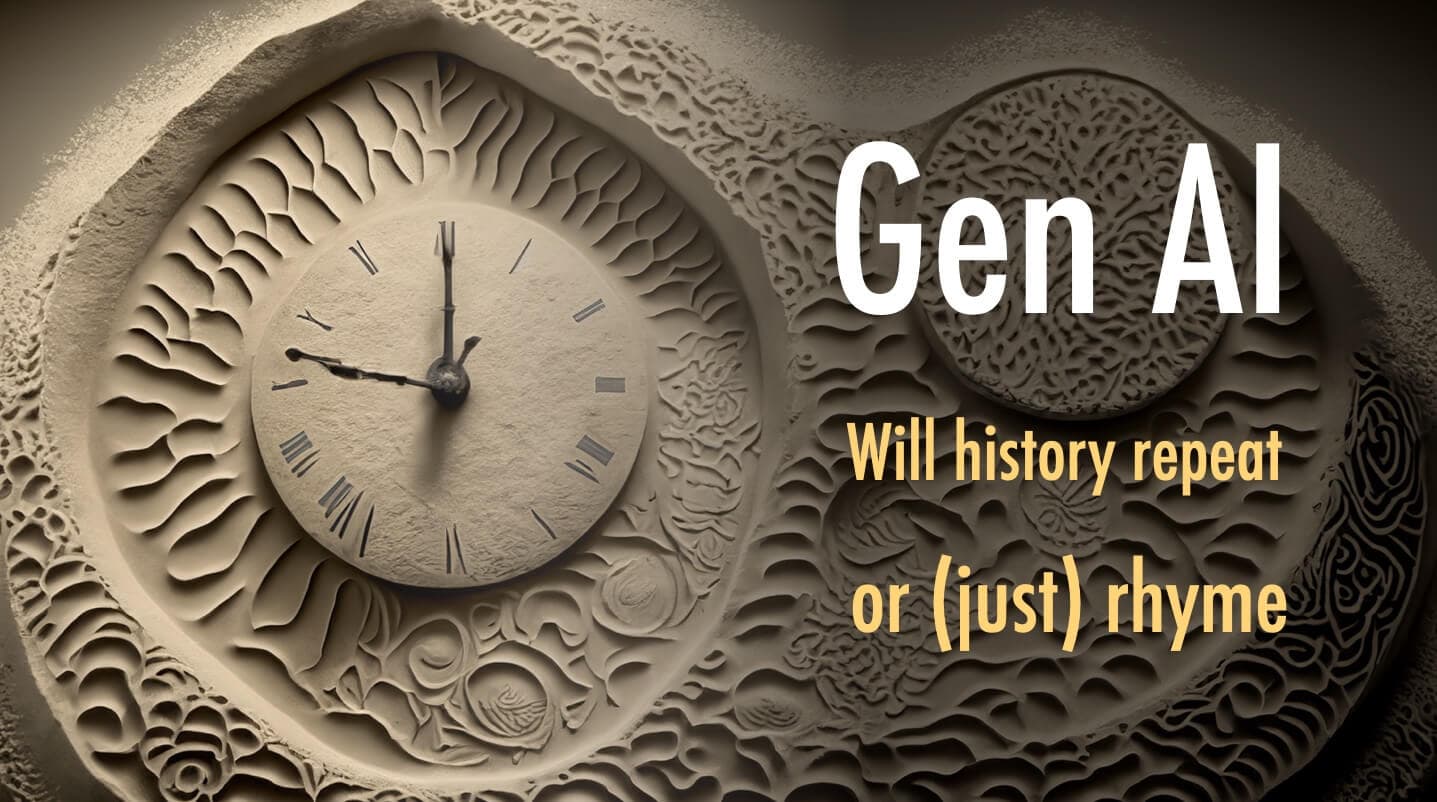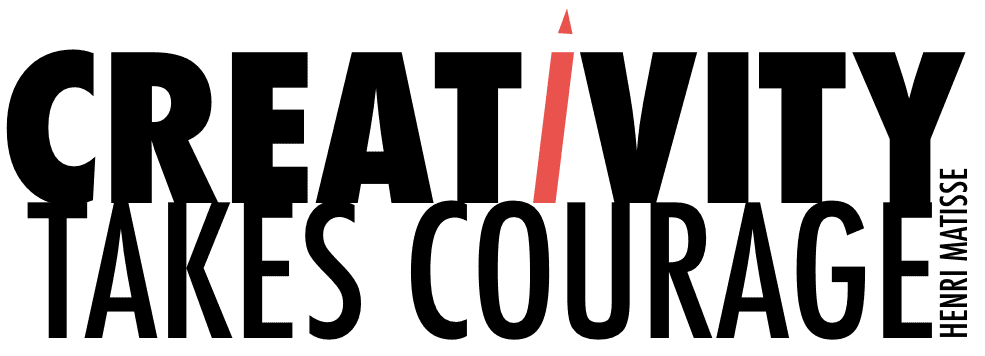As generative AI continues to reshape our world, we’re faced with a crucial question: Will we repeat the mistakes we made with previous technologies or will this time be something different? George Santayana famously warned, “Those who cannot remember the past are condemned to repeat it.” Mark Twain offered a slight variation, quipping that “History doesn’t repeat itself, but it does rhyme.“
(Incidentally, the quote from Santayana is often misquoted as “Those who forget their history are condemned to repeat it.” The irony, of course, being that though he never said those specific words, we appear to be condemned to repeating them.)
In other words, what can we learn from the past?
Will history repeat (or just rhyme)?
I was recently asked this question after I delivered my keynote presentation (titled: Education in an age of generative AI) at the Generative AI in Education Conference at the University of Michigan Flint, last week.
To give some context, one of the topics I touched on was what we could learn from the recent history of social media. In my talk I argued that when social media first entered our world, educators (myself included) focused narrowly on strategies for incorporating social media into classroom contexts. What we paid less attention to where the ways these technologies could negatively impact the broader social context within which education functions. In fact, there are blog posts on this very website that stand as testimony to my naivete. I did not spare a thought to the possibility (now so real) that social media could exacerbate polarization, erode trust in institutions, and harm the mental health of the most vulnerable. These consequences are now evident and form a significant challenge to educational institutions.
Today when we stand at the cusp of a new technology, I try NOT to let that mistake happen again. Hence, when it comes to generative AI, I am both excited by it but also wary of it.
But what did I learn from the recent history of social media? This was in effect the question that an audience member threw my way. The question and my response (lightly edited) are taken from the transcript of this interaction.
They asked: When you talk about missing the impact of social media, or when you saw the social media revolution, what lessons in application did you learn? Or is it about the warning label that should have been on it? Finally, what should we be telling our students? What do we do?
Thank you for the question. This is something I have been thinking a lot about.
One of the first things it has pushed me to do is to go back and read people like McLuhan, Postman, and Ong more seriously, because they talked about the nature of the medium and why it’s important to understand it. As Ezra Klein said, when we talk about television, we often focus on the programs we watch and make judgments based on that. Watching PBS is better than watching some junky reality show. What we don’t think about is how the medium of television itself shapes the world, just like the medium of print does.
For instance, if we consider social media, I’ve come to realize that understanding social media means understanding the idea of status – as humans, we always care about how others think of us. It’s not just for teenagers; even I get concerned if only a few people like my LinkedIn post. So social media culture in some sense is similar to oral culture but with anonymity at a massive scale thrown in. A recipe for disaster.
The first step, therefore, is to try to understand the nature of the medium because they’re not neutral. This is not an argument for media determinism. Not at all – but we have to accept the fact that different media have unique strengths and weaknesses and in some sense “The medium IS the message.”
This brings me to the second point which is that any medium plays out in a world with certain economic factors, biases already built in, disparities, inequities and so on. Once we understand the nature of the medium we need to start thinking of the world that this “creature” is going to enter and how it will interact with the existing social, psychological, economic, and political systems. How will it be changed by these systems and, in turn, how it will change these systems?
The science fiction writer Ted Chiang has this great quote (and I am going to mangle it but bear with me) saying something like, “Fear of technology is actually often fear of the economic system within which the technology exists.” This is not an argument against capitalism, as there are many “knobs” within capitalism that can be adjusted differently. I can see for instance that if, let’s say with the early internet, we hadn’t gotten addicted to the idea that it should be free, and had figured out microcredit payment and subscription-based models early on, we wouldn’t have taken that decision to go the direction of advertising, engagement, and eyeball-grabbing.
Then you see the mania that happened with listicles, YouTube algorithms pushing people to stay longer on websites by recommending more extreme content. All of that is a consequence of a certain early decisions. And now look at us, we’re going back to the subscription model because we realize the ad-driven model doesn’t necessarily work correctly or is flawed.
There could have been a very different alternative future to social media. Which is why I have increasingly become sensitive to these broader structural things, which are often invisible to us but determine our actions in ways we don’t realize.
This means that I have started thinking a lot more about the nature of generative AI. What is inherent to this new technology that is important for us to understand. I have argued that its inherent qualities (its real nature) are that it is generative, multimodal, and conversational. The question then becomes what does it mean to have such a technology around us all the time? What does it allow? And what does it constrain?
And, finally, what happens when this beast enters a world wracked by political dissension, fake news, influencers willing to sell their soul for followers and more.
This is not an argument for either technological or cultural determinism but rather for our being sensitive to the complex transaction between both these things—the technology and the cultural matrix within which it drops.
This also does not mean that we know what this is going to look like – but at the very least it gives us some humility and some sophistication in how we approach these complex topics.
Coming back to the two quotes that started this piece, and at a more personal level, I think that both Santayana and Twain got it wrong. I am both optimistic at an individual level yet deeply pessimistic about our ability (as a species) to deal with this new technology. I don’t think it really matters whether we remember history or not—we are doomed to repeat it.
As French author Michel Houellebecq reflected on the impact of the Covid pandemic, he offered a sobering prediction: “We will not wake up after the lockdown in a new world. It will be the same, just a bit worse.”
My gut instinct tells me Houellebecq’s words may prove prophetic when it comes to generative AI’s impact. Despite our best efforts to glean insights from the past, we may find ourselves slipping into familiar patterns – the same missteps and unintended consequences, just amplified by AI’s formidable capabilities. The core human flaws that enabled previous technological pitfalls remain deeply rooted in our psychology and our culture.
It will be the same, just a bit worse.
And finally, when it comes to education, and the question of what are we as educators to do? What should we tell our students?
I say we should tell them exactly this. Tell them that we don’t know. This is all very new for us as well. What other choice do we have? Can we with a straight face say, “We know what’s going on”? When, in actuality, we have no clue and very little control over most of it.
I remember telling my kids, when they were little, that I had never been a parent before, and they had never been children before – so we were all learning on the job. I told them that I was quite confident that we would both screw up as we went along.
But we will get through it together.
That’s the only truth I know.





0 Comments